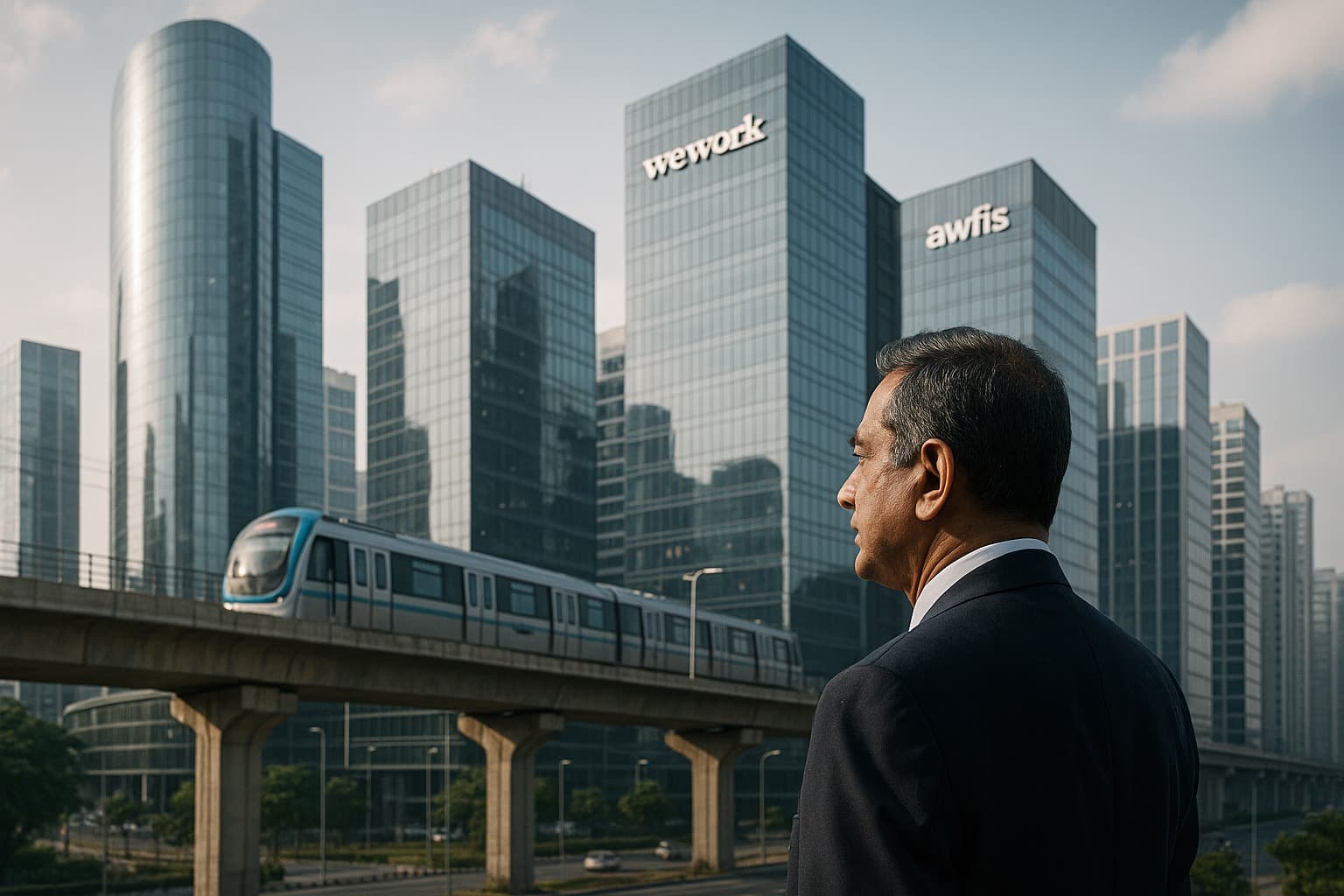How Startups are Reshaping Commercial Real Estate Demand in India
Summary
India's startup boom is reshaping commercial real estate, driving demand for flexible office spaces and tech-enabled infrastructure. Investors are focusing on startup-centric zones and co-working portfolios to capitalize on this growth.

Picture this: It’s Monday morning in Bengaluru. A small team of five is working on a fintech app in a cramped, rented office. By Friday, the team has grown to ten, and by the next month, they’re outgrowing the space. Suddenly, they need a bigger office — one with modern amenities, good connectivity, and a lively neighborhood to attract talent. This is the real story behind how startups drive CRE demand in India. Startups aren’t just building companies; they are reshaping commercial property requirements and fueling real estate growth across metro and emerging cities.
The Startup Boom and Its Impact on CRE India
India has become one of the largest startup ecosystems in the world. Cities like Bengaluru, Hyderabad, Pune, Mumbai, and Gurugram are buzzing with innovation. Over 120,000 startups operate in India today, with thousands more emerging each year. This explosive growth is a major driver of office space demand in CRE India.
Startups have unique requirements: flexible layouts, tech-enabled infrastructure, and proximity to talent. This is why startup growth and office space demand India are closely intertwined. Developers are redesigning commercial spaces, creating co-working hubs, and constructing modular offices that cater to the dynamic nature of startups.
Office Space Demand from Startups
Startups scale quickly. A team of 5 today might become 50 tomorrow. This rapid expansion drives continuous demand for commercial property. Developers and investors are responding in innovative ways:
Flexible office layouts that adapt as companies grow Co-working spaces to reduce upfront costs and allow scalability Prime locations near tech corridors to attract talent Modern amenities like high-speed internet, meeting rooms, and wellness zones
These trends explain how startups drive CRE demand in India and why co-working and tech-enabled spaces are booming.
Startups Shaping CRE Trends
The influence of startups on CRE India goes beyond just physical space:

Co-working revolution: Companies like WeWork, Awfis, and 91springboard are thriving, responding to startups’ demand for flexible, shared office solutions. Tech-enabled offices: Startups require high-speed internet, collaborative zones, and ergonomic interiors. Location sensitivity: Being near universities, metro stations, or IT hubs influences CRE growth India. Short-term leases: Startups often prefer short-term arrangements, prompting developers to innovate with lease structures.
In essence, startups shaping India’s property demand are redefining how commercial spaces are designed, rented, and invested in.
Case Study: Bengaluru
Bengaluru, India’s “Silicon Valley,” provides a clear picture of this phenomenon. Areas like Whitefield, Koramangala, and Outer Ring Road have experienced a surge in office space demand growth due to startups in India. Tech parks and co-working hubs have mushroomed to accommodate small and medium-sized companies. Even traditional commercial spaces are being revamped with modern amenities to suit startup needs. This explains how Indian startups are driving demand for commercial real estate and why metro cities are the primary beneficiaries.
CRE Investment Trends 2025
The startup-driven demand is influencing investment patterns too. Institutional investors are now targeting commercial properties that cater specifically to startups. Trends include:
Higher yields in startup-centric zones: Properties near tech hubs see better rental returns. Acquisition of co-working portfolios: Investors are buying stakes in flexible office providers. Steady appreciation: Continuous demand ensures long-term property value growth.
These trends show why CRE demand is rising with India’s startup boom and highlight their impact on CRE investment trends 2025.
Co-Working: The Intersection of Startups and CRE
Co-working is the most visible impact of startups on CRE. These spaces are popular because they offer:
Flexible lease terms Plug-and-play amenities Opportunities for networking with other startups
For investors, co-working represents a new, high-demand segment of commercial property. By creating modular, tech-enabled spaces, CRE developers align directly with startups shaping India’s property demand.
Tier-2 Cities Emerging
The startup-CRA connection isn’t limited to metros. Tier-2 cities like Pune, Ahmedabad, Kochi, and Jaipur are seeing increased startup activity. Developers are expanding office spaces in these cities, anticipating future demand. These emerging hubs offer lower costs, high growth potential, and opportunities for early investors to capitalize on the impact of startups on CRE investment trends 2025.
Hybrid Office Models
Post-pandemic, hybrid work is redefining office space demand. Startups want:
Some employees in-office, some remote Flexible space for collaboration Small private offices alongside shared areas

This is pushing CRE developers to design multi-functional spaces and adapt commercial property to the changing workplace. Startups are not just tenants; they’re shaping the very structure of the real estate market.
Practical Takeaways for Investors
Focus on cities with strong startup ecosystems: Bengaluru, Hyderabad, Pune, Gurugram, and Mumbai. Evaluate co-working and flexible office developments. Track trends in fast-growing industries: fintech, SaaS, biotech. Consider short-term vs long-term lease potential to optimize ROI. Prioritize prime locations near tech clusters and talent pools.
These steps allow investors to leverage how startups drive CRE demand in India and maximize real estate growth.
Real-Life Example
Consider a fintech startup in Pune. In 2020, it rented a 1,500 sq ft office. By 2023, the team had grown to 60. The company shifted to a larger co-working hub with modular setups, high-speed internet, and meeting rooms. The demand created a ripple effect: nearby office rents rose, new CRE projects were launched, and investors profited from rental income. This illustrates startups reshaping commercial real estate in metro cities and driving office space demand growth due to startups in India.
Final Thoughts
Startups are more than economic drivers; they are catalysts for CRE India. From co-working spaces to tech-enabled offices, startups are shaping office layouts, lease structures, and investment patterns. Understanding how Indian startups are driving demand for commercial real estate and the resulting impact of startups on CRE investment trends 2025 allows investors to identify prime opportunities. By aligning commercial property strategies with the needs of startups, investors can enjoy long-term appreciation, strong rental returns, and a secure, forward-looking portfolio.
Summary (100 words)
India’s startup boom is reshaping CRE India, creating unprecedented demand for commercial property. Rapidly growing teams, short-term leases, and flexible workspace needs are driving office space demand growth due to startups in India. Co-working hubs, tech-enabled offices, and modular spaces reflect startups shaping India’s property demand, especially in metro cities like Bengaluru, Hyderabad, Pune, and Gurugram. Institutional investors are taking note, targeting high-demand zones and acquiring co-working portfolios. Understanding how Indian startups are driving demand for commercial real estate and the resulting impact of startups on CRE investment trends 2025 helps investors capitalize on growth, maximize rental yields, and achieve long-term returns.
